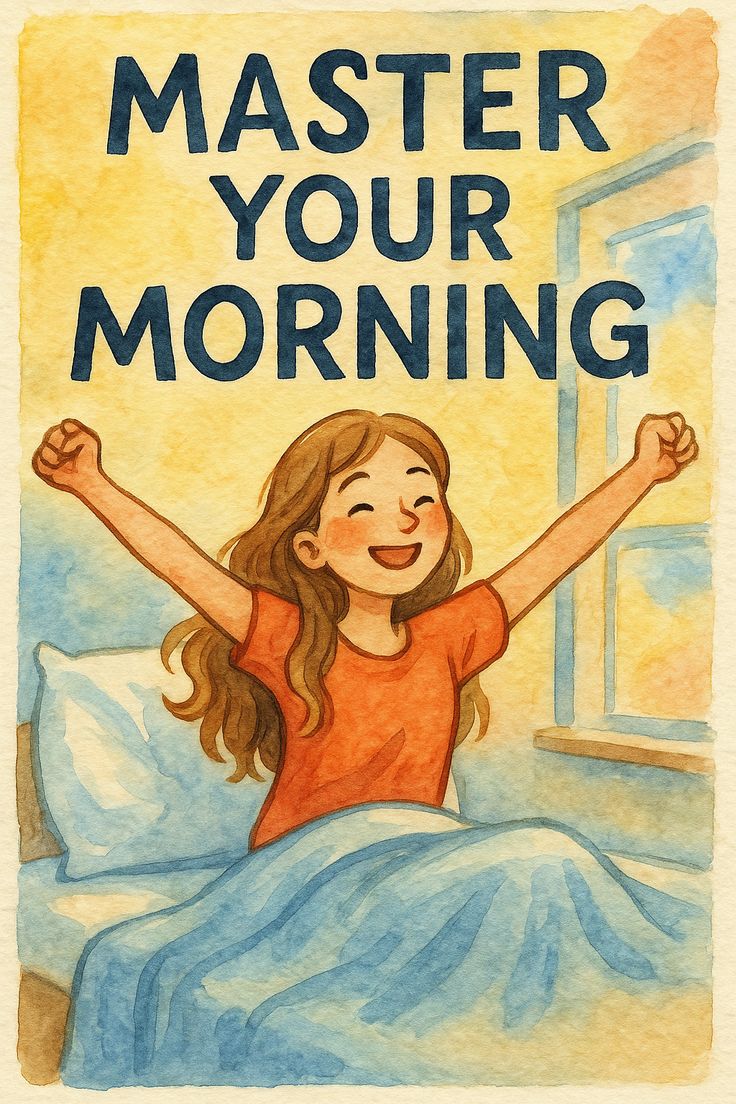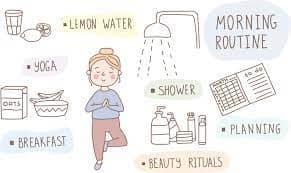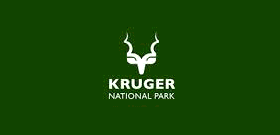Morning Routines of Highly Creative People And How to Build Yours

Introduction
Every great masterpiece, every revolutionary idea, and every cultural breakthrough we admire often begins not just with inspiration but with discipline. While creativity is often viewed as spontaneous, the truth is that some of the world’s most creative minds owe their genius to daily rituals, particularly what they do in the first few hours of the day.
From writers and musicians to entrepreneurs and inventors, morning routines have been the backbone of productivity and innovation. They set the tone for the day, sharpen focus, and unlock mental clarity. But here’s the big question: What exactly do highly creative people do in the morning, and how can you design a routine that fuels your own creativity?
Let’s take a deep dive into their habits and how you can build one that works for your lifestyle.
Why Mornings Matter for Creativity
Science backs what many great creators have practiced for centuries: mornings are when the brain is freshest, uncluttered, and most receptive to ideas. Studies in neuroscience reveal that our prefrontal cortex the part of the brain responsible for decision-making, problem-solving, and creativity is most active after a good night’s rest.

Morning routines:
Reduce decision fatigue (you save brainpower for creative tasks).
Create predictability, which calms the mind and lowers anxiety.
Provide momentum, the first few hours often dictate the productivity of the rest of the day.
This explains why everyone from Maya Angelou to Steve Jobs crafted intentional mornings that supported their creative output.
Examples of Morning Routines from Creative Icons
Culture
Read Between the Lines of African Society
Your Gateway to Africa's Untold Cultural Narratives.
1. Maya Angelou – Writing Before Distractions
The legendary poet would wake up early, leave her home, and head to a rented hotel room to write from 6:30 a.m. until around 2 p.m. She believed mornings were sacred for creativity, free from household distractions.
Lesson: Carve out quiet time and space for your craft before the world interrupts you.
2. Steve Jobs – Clarity Through a Single Question
Every morning, Jobs looked in the mirror and asked: “If today were the last day of my life, would I want to do what I’m about to do today?” This simple reflection helped him align daily tasks with deeper purpose.
Lesson: Start with intention. Asking meaningful questions can sharpen focus and fuel creative energy.
3. Haruki Murakami – Discipline in Simplicity
The Japanese novelist wakes at 4 a.m., writes for 5–6 hours, then runs or swims. His strict routine has powered global bestsellers like Norwegian Wood and Kafka on the Shore.
Lesson: Creativity thrives on consistency. You don’t need drama—you need rhythm.
4. Benjamin Franklin – A Structured Self-Check
Franklin’s mornings were deliberate. He began each day with the question: “What good shall I do today?” He mapped out tasks, read, and prepared his mind for work.
Lesson: Morning reflection + planning brings both purpose and structure.
5. Oprah Winfrey – Centering the Mind
Oprah starts her day with meditation, exercise, and gratitude journaling. By setting an emotional and spiritual foundation, she creates balance before tackling business.
Lesson: Creativity doesn’t just need energy—it needs emotional alignment.
Culture
Read Between the Lines of African Society
Your Gateway to Africa's Untold Cultural Narratives.
Core Elements of a Creative Morning Routine
While every creative icon has a unique approach, their routines share similar pillars. Here are the essential components you can weave into your mornings:

1. Early Rising (But Personalize It)
Many creative people wake up early because the world is quieter, offering fewer distractions. But “early” should align with your natural rhythm. The key is consistency, not competing with a 4 a.m. club.
2. Mindful Grounding
This could be meditation, prayer, journaling, or even sitting in silence. The goal: clear mental clutter and focus your mind before diving into work.
3. Movement
Exercise is common in many routines—running, yoga, swimming. Physical activity energizes the body and boosts brain chemicals like dopamine and serotonin, which are linked to creativity.
4. Focused Creative Work First
Tackle your most important creative task before emails, social media, or meetings. Early mornings are for original thinking, not reacting to others.
5. Fuel the Brain
A healthy breakfast or hydration ritual supports energy and focus. Coffee, tea, or a protein-packed meal, pick what fuels you best.
6. Reflection and Planning
Writing down intentions, gratitude, or daily goals creates mental structure. Clarity in the morning saves time throughout the day.
Culture
Read Between the Lines of African Society
Your Gateway to Africa's Untold Cultural Narratives.
Building Your Own Creative Morning Routine
Now that you know what works for creative legends, here’s a blueprint to craft yours:
Step 1: Define Your Creative Priorities
What do you want to accomplish, writing, painting, coding, building strategies? Knowing your creative “why” will shape your morning activities.
Step 2: Design Around Energy Levels
Are you a morning person or a night owl? If mornings feel dull, try gentle activities (like journaling or a walk) before diving into heavy creative work.
Step 3: Start Small
Don’t overhaul your life overnight. Add one element at a time, like 10 minutes of journaling or stretching. Gradual shifts build lasting habits.
Step 4: Eliminate Morning Noise
Delay checking your phone, emails, or social media. Protect the first 1–2 hours for you.
Step 5: Experiment and Refine
Not every habit will work. Swap meditation for reading, or running for yoga. The goal is balance between inspiration and discipline.
The Neuroscience of Morning Creativity
Culture
Read Between the Lines of African Society
Your Gateway to Africa's Untold Cultural Narratives.
Psychologists argue that mornings provide a “creative sweet spot.” After rest, the brain is less inhibited, meaning it’s more open to unusual connections and new ideas.
Alpha brain waves, associated with creativity, are higher when you first wake up.
The prefrontal cortex functions best early in the day, making it easier to problem-solve and plan.
Morning rituals reduce stress hormones like cortisol, keeping you calmer and more focused.
In short: structured mornings help train your brain to enter flow faster and stay there longer.
Common Myths About Creative Routines
“I need to wake up at 4 a.m. to be successful.”
Not true. What matters is consistency and energy management.
“Creatives are chaotic; routines kill inspiration.”
In reality, routines free mental space, so you can channel chaos into creativity.
“I must copy someone else’s routine exactly.”
Your lifestyle, culture, and goals are unique. Use routines as inspiration, not strict rules.
Practical Morning Routine Blueprint
Culture
Read Between the Lines of African Society
Your Gateway to Africa's Untold Cultural Narratives.
While it us best for you to pick what works best for you as there is no universal blueprint for a practical morning routine, here’s a balanced 90-minute routine you can use and also customize to suit yourself:
6:30 a.m. – Wake up, drink water, stretch.
6:45 a.m. – 10 minutes meditation or gratitude journaling.
7:00 a.m. – 20–30 minutes exercise (walk, yoga, or workout).
7:30 a.m. – Healthy breakfast + tea/coffee.
8:00 a.m. – 45 minutes deep creative work (writing, painting, problem-solving).
8:45 a.m. – Quick planning for the rest of the day.
This framework blends mental, physical, and creative nourishment.
The Ripple Effects of a Creative Morning Routine
Greater Productivity: Clear mornings reduce wasted energy later in the day.
Better Mental Health: Journaling, meditation, and exercise combat stress and anxiety.
Consistent Output: Habits reduce reliance on “waiting for inspiration.”
Increased Self-Confidence: Accomplishing meaningful work early boosts motivation.
Culture
Read Between the Lines of African Society
Your Gateway to Africa's Untold Cultural Narratives.
Harnessing "You" For Productivity
The world’s most creative people don’t wait for inspiration to strike, they engineer it. By embracing intentional mornings, they shape their minds, sharpen their focus, and fuel creativity long before the distractions of the day begin.

Your morning doesn’t have to look like Murakami’s or Oprah’s. The key is building rituals that ground you, energize you, and give your creativity a stage to shine.
So tomorrow morning, before you reach for your phone or get pulled into the noise of the world, ask yourself: What small habit could I practice today to unlock my best ideas?
Because in the end, creativity isn’t just about talent—it’s about the habits you build, one morning at a time.
Recommended Articles
You may also like...
Stunner! Minnows Bodo/Glimt Humiliate Manchester City in Shock Upset
)
Manchester City's recent struggles intensified with a 3-1 Champions League defeat against Bodo/Glimt, compounding their ...
Former NBA Star Lamar Odom's DUI Arrest Rocks Sports World

Former NBA star Lamar Odom was arrested on suspicion of DUI in Las Vegas over the weekend, facing potential charges incl...
George R.R. Martin Slams 'A Knight of the Seven Kingdoms' Amid Game of Thrones Spin-Off Debate

George R.R. Martin's new HBO prequel, *A Knight of the Seven Kingdoms*, marks a significant tonal shift in the Westeros ...
John Summit Drops Bombshell: Epic 2026 [UNVRS] Ibiza Residency Confirmed!
![John Summit Drops Bombshell: Epic 2026 [UNVRS] Ibiza Residency Confirmed!](https://www.billboard.com/wp-content/uploads/2026/01/Billboard-John-Summit-UNVRS-2026.jpeg?w=1024)
John Summit is launching his first-ever Ibiza residency in 2026 at the mega-club [UNVRS], featuring nine 'Experts Only' ...
Taylor Swift's 'The Fate of Ophelia' Reign Continues: Fifth Week at Global No. 1!

Taylor Swift's "The Fate of Ophelia" secures its fifth week atop both the Billboard Global 200 and Global Excl. U.S. cha...
Akin Faminu's Daring Denim: A Bold Fashion Statement

Style icon Akin Faminu redefines denim fashion with a striking full denim look, featuring a structured jacket and statem...
Kruger National Park Grapples with Flood Chaos: Gates Closed, Access Limited

Kruger National Park is currently grappling with severe access challenges due to extensive flooding and infrastructure d...
Elon Musk Unveils Vision: Tesla's Dojo3 AI to Power Space Computing

Elon Musk has announced Tesla's ambitious plan to revive its Dojo3 AI chip project, now specifically targeting "space-ba...

